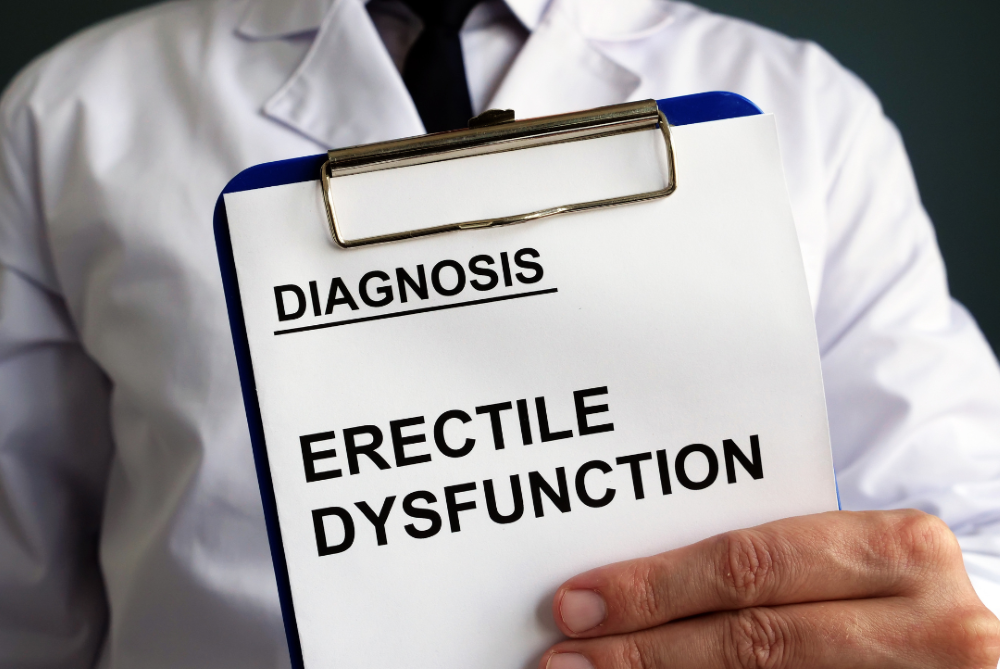Erectile dysfunction (ED) is when a man cannot achieve and/or maintain a full erection. Sometimes the penis may become semi-erect but may not be hard enough to have sex. In some cases there is no change to the penis at all.
Most men at some point in their lives may be affected by ED on at least one occasion. Common causes for this can be stress, fatigue, and excess alcohol to name a few. However, some men consistently struggle to get an erection. ED becomes more common with age. Approximately half of men are affected aged 40-70, rising to two thirds of men over 70.

What causes ED?
There are several different causes that can be grouped into physical or psychological causes. The majority of cases (8/10) are physical. The remaining psychological causes include stress, depression, anxiety and relationship difficulties.
The main physical cause of ED is due to reduced blood supply to the penis and this can occur due to a build-up of cholesterol deposits that narrow the arteries (atherosclerosis). Diabetes and high blood pressure are also common causes. Conditions such as Parkinsons disease and multiple sclerosis can also cause ED by affecting the nerve supply to the penis. Other causes can include medication, smoking and alcohol excess.
What traditional treatments are available?
There are a variety of treatments available for ED including lifestyle modification, medication in various forms, vacuum devices and even surgical options.
Shockwave therapy
More recently, however, a new treatment option has become available, known as Low Intensity Extracorporeal Shockwave Therapy (LI- ESWT). It is a treatment that uses low intensity shockwaves to create new blood vessels, thereby improving blood flow to the penis. This means that the treatment is particularly suitable for those with ED that is due to a medical factor such as cardiovascular disease, peripheral disease or diabetes. This technology has been used since the 1980’s and has been used safely and effectively in different areas of medicine, for example, treatment of kidney stones and heart failure.
How does it work?
The sound waves cause reactions in the body that increases the levels of growth factors. These, in turn, cause the creation and growth of new blood vessels. It is the growth of these new blood vessels that allow the body to respond in a natural way, which allows the treatment to be termed “curative” ie, it treats the underlying cause of ED rather than treating the symptoms. The European Association of Urology now list this therapy as a possible treatment option, along with the more traditional medication, lifestyle modification and vacuum devices.
Although this treatment is relatively new to the market, investigators have been studying its effects since 2005. A recent meta-analysis (an examination of data from a number of independent studies of the same subject) was undertaken from 9 studies performed from 2005-2017 using over 600 men. The studies used questionnaires before and after treatment in order to gauge any improvement in mens’ erections. Results showed that shockwave therapy could significantly improve the mens’ symptoms as seen by increased scores in the questionnaires.
In other studies, men have reported noticing improvement in their symptoms as soon as 3 weeks after shockwave treatment, with some studies reporting the effect lasting for up to 2 years.
At Roc, we are pleased to announce that we are now offering the latest technology in Shockwave therapy as part of our dedicated ED clinic. MoreNova shockwave therapy has the advantage of much shorter treatment protocols than other shockwave treatments on the market, with the option of 5 short treatment sessions over a 5-day period. The therapy is pain-free and non-invasive.
For more information, please see our website or contact us directly at 01224 920527 (Aberdeen).


